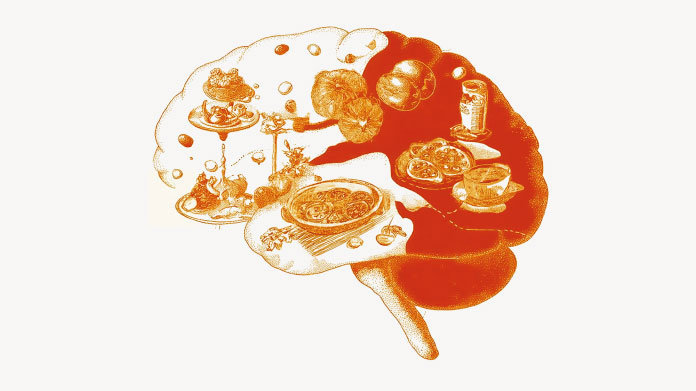What can you do to gain weight?
Think you’re too skinny but can’t seem to bulk up? Lost a lot of weight and struggling to get back to normal? Need to gain muscle mass? Our round-up of the best tips and science-backed substances will help you finally achieve your weight gain goals.

Gaining weight: first and foremost, a matter of calories
In theory, gaining weight is simple. All you have to do is provide your body with more energy than it needs: approximately 2000-2200 kcal for women, and 2400-2700 for men, around 70% of which will be used up covering essential functions.
Of course, energy expenditure is likely to increase if you exercise, but the logic remains the same: if you maintain a balance between energy input and output, your weight will remain stable. If you eat too little, your body will draw on its reserves and you will lose weight in the medium term all the time the imbalance persists. If you overeat, the opposite occurs: the body stores any excess in the form of fat, or muscle mass if accompanied by the right kind of exercise.
Factors that also affect weight gain
In practice, however, it’s a bit more complicated. Baseline energy expenditure varies significantly from one person to another: certain individuals are genetically ‘programmed’ to gain weight quickly while the reverse is true for others (1).
Thin people may not be able to create the necessary imbalance, through lack of appetite, very high metabolism which adapts to food intake, or other mechanisms involving the microbiota and brown fat which are as yet, little understood. Women are usually more affected than men.
Fortunately, there are ways of creating a significant energy differential, by sensibly increasing your energy input and temporarily reducing your energy output.
8 tips for gradual, healthy weight gain
All foods are permitted to produce a significant energy surplus, but for health reasons, it is better to eat as balanced a diet as possible. There are three ways to achieve this: stimulate the appetite, avoid foods with a low energy density (which take up a lot of room in the stomach), and slow down your metabolism.
A sensible goal would be to progressively increase your calorie intake by 250-500 calories a day, to achieve a weekly weight gain of 250-500g.
Here are 8 tips to help you gain weight healthily and effectively :
- eat foods with a high energy density. These are found in every food group: fruit (dried fruit, bananas, mangoes, grapes, cherries, avocados, olives), vegetables (peas, sweet potatoes, potatoes), legumes, wholemeal bread, cereal bars, dairy products (cheese, cream, full-fat milk, soya yogurts), oily fish (tuna, salmon, sardines …), meat (liver, chicken thighs, beef, pork), eggs, nut butter, vegetable oils, homemade biscuits ... Using foods like these, it’s easy to come up with menus for gaining weight;
- opt for cooked vegetables or vegetable soups, and fruit compotes, so they take up less space in the stomach;
- add ingredients to your meals that increase calorie intake without adding bulk. This could be vegetable oil with vegetables and starches, high-fat sauces with meat or fish, dried fruit in pastries, grated cheese or egg yolks with pasta, honey with desserts, cream with main dishes or desserts whenever possible ...;
- have snacks in addition to high-calorie meals. You could either add one large snack (of 500 calories) or several smaller ones of 200 calories based on dried fruit, nuts, oilseeds, yogurt, soya milk, slices of wholemeal bread ... Try to get into the habit of eating a hearty breakfast;
- take moderate exercise, preferably before meals, but avoid strenuous exertion (athletics, running, trail running …) It’s an excellent way of working up an appetite even if it uses up some extra calories. Without this element of activity, your weight gain may all be in the form of fat;
- avoid drinking with meals: drinks fill up the stomach, potentially reducing your food intake. But make sure you drink regularly between meals to maintain optimal hydration, opting for milk, juice, and plant-based drinks;
- stimulate your appetite as much as possible. Take some light exercise before a meal, don’t eat alone, take time to savor your meals, and choose good quality, appetizing foods … ;
- try to slow down your metabolism. Stress, smoking, caffeine or temperature variations – factors that can be avoided or reduced – can all speed up metabolism.
In all cases, your diet should be high in vitamins, minerals, and omega-3 fatty acids: this is essential for achieving healthy, durable weight gain.
Substances and supplements good for accelerating weight gain
If, in addition to dietary changes, you still need an extra boost, taking appropriate dietary supplements can be effective, whether for increasing your calorie intake, stimulating your appetite, or slowing down your metabolism. Here is a - by no means exhaustive - list:
- oral nutritional supplements, a cross between a food and a medicine. They normally come in the form of a drink, cream, or soup (so as not to take up too much room in the stomach), with various nutritional compositions. They are usually consumed cold, in between meals;
- ‘enriched foods’, such as protein yogurts and bars, though consumption of these typically ultra-processed foods should be limited;
- protein supplements such as whey, an excellent source of branched-chain amino acids (BCAA), which help to stimulate protein synthesis and produce increased muscle mass without expanding your waistline;
- supplements that help fight stress (such as Stress Relief Formula), as they can increase the basal metabolic rate;
- probiotics (such as Probio Forte), as gut flora can be a contributory factor in thin people struggling to gain weight;
- supplements which help restore appetite (such as Super Harpagophytum), as the main challenge for people who are too thin is the lack of desire to eat more.
SuperSmart ADVICE
References
- Brüning JC, Fenselau H. Integrative neurocircuits that control metabolism and food intake. Science. 2023 Sep 29;381(6665):eabl7398. doi: 10.1126/science.abl7398. Epub 2023 Sep 29. PMID: 37769095.
Keywords
8 Hours
repeat customer
recommended by my doctor. easy to create an account. Discounts and specials are appreciated. packaging and delivery is dependable. Capsules easy to digest. I've had some some capsules and tablets that are broken inside their bottles.
Kokee
4 Days
Order was shipped on time and packaged…Wonderful Jobs!
Order was shipped on time and packaged excellently.
DMHoge
11 Days
great products and prices
great products and prices
Marie
16 Days
Easy to navigate site
Easy to navigate site, had what I was searching for, good price. easy order-check out
James Tucker
23 Days
My skin is clearing up nicely!
Pretty good for my skin so far.
Christian
25 Days
The new packaging is excellent
The new packaging is excellent - finally! No more squashed boxes and torn envelopes.
GORAN
26 Days
Great Product
Great Product
Larry Garrett
30 Days
Quick shipping
Quick shipping; good price. No issues!
Mary McCarty
31 Days
Thr product is very good and is helping…
Thr product is very good and is helping me on my health. Then is always on time
LUGO Luz
34 Days
Buying was fine
Buying was fine. I had problems with the website not recognizing my login info, and had to call to get it fixed. Other than that, everything was good.
David S. Clark
34 Days
Your super maca and super ginseng are…phenomenal
Your super maca and super ginseng are phenomenal supplements that compliment each other when taking them together. Fantastic feeling of well-being and lots of mid day energy without the crash.
Keith Mason
37 Days
I have had amazing results with every…
I have had amazing results with every supplement I've purchased. I am extremely satisfied with this company
kirstin Torres
37 Days
Fine products
Fine products . They are on the leading edge of online supplements. The only issue -so far-is they sometime run out of subscription items.
Jason Argos
40 Days
The ordering process is very user…
The ordering process is very user friendly and the products always come in a timely manner.
CARTER Rhonda
41 Days
The price for Dr
The price for Dr. Pero's AC-11 is reasonable and in line with his views. (my former colleague). Keep it pure.
CAMPBELL Clayton








